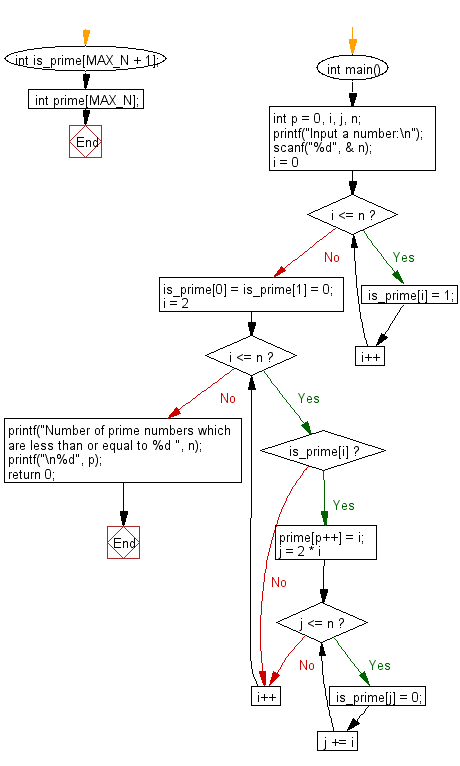C Exercises: Find the prime numbers which are less than or equal to a given integer
Find all prime numbers ≤n\leq n≤n
Write a C program to find prime numbers that are less than or equal to a given integer.
Input:
n (1 <= n <= 999,999)
Sample Solution:
C Code:
#include<stdio.h>
#define MAX_N 999999
int is_prime[MAX_N + 1];
int prime[MAX_N];
int main() {
int p = 0, i, j, n;
// Prompting the user to input a number
printf("Input a number:\n");
scanf("%d", &n);
// Initializing the is_prime array to all true (1)
for (i = 0; i <= n; i++)
is_prime[i] = 1;
is_prime[0] = is_prime[1] = 0; // 0 and 1 are not prime
// Finding prime numbers using the Sieve of Eratosthenes algorithm
for (i = 2; i <= n; i++) {
if (is_prime[i]) {
prime[p++] = i; // Storing prime numbers in the prime array
for (j = 2 * i; j <= n; j += i)
is_prime[j] = 0; // Marking multiples of a prime as not prime
}
}
// Printing the number of prime numbers and the count
printf("Number of prime numbers which are less than or equal to %d ", n);
printf("\n%d", p);
return 0; // End of the program
}
Sample Output:
Input a number: 123 Number of prime numbers which are less than or equal to 123 30
Flowchart:

For more Practice: Solve these Related Problems:
- Write a C program to implement the Sieve of Eratosthenes and print all primes less than or equal to n.
- Write a C program to iterate through numbers up to n and check for prime status using trial division.
- Write a C program to use recursion to list prime numbers below a given limit n.
- Write a C program to generate primes up to n and store them in an array for later processing.
Go to:
PREV : Count combinations of four digits summing to nnn.
NEXT : Check if a point lies within a triangle.
C programming Code Editor:
Have another way to solve this solution? Contribute your code (and comments) through Disqus.
What is the difficulty level of this exercise?
Test your Programming skills with w3resource's quiz.
